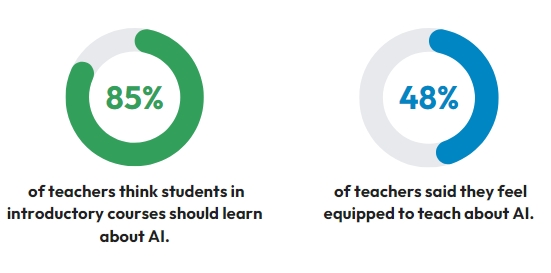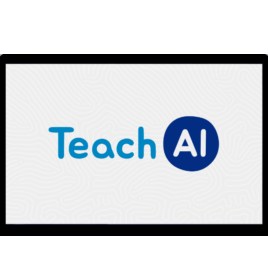| Kids Still Need Computer Science Education |
| Written by Sue Gee | |||
| Monday, 29 July 2024 | |||
|
Should kids still learn to code now that AI-tools will soon take over this task? According to Teach AI, the rise of AI makes CS education even more important and it has teamed up with the CSTA to provide guidance to help teachers adapt to the age of AI.
As we reported at the time, Teach AI was launched last year, with funding from Code.org, with the mission of empowering educators to teach with AI and about AI Specifically: TeachAI is committing to provide thought leadership to guide governments and educational leaders in aligning education with the needs of an increasingly AI-driven world and connecting the discussion of teaching with AI to teaching about AI and computer science. This month, at the Computer Science Teachers Association conference, Teach AI together with the CSTA issued three briefs designed to explain why and how teachers should balance AI with Computer Science in the classroom, arguing that: "K-12 computer science education is more important than ever in an age of AI." The explanation given was: "As AI becomes increasingly present in the classroom, educators are understandably concerned about how it might disrupt the teaching of core CS skills like programming. With these briefs, TeachAI and CSTA hope to reinforce the idea that learning to program is the cornerstone of computational thinking and an important gateway to the problem-solving, critical thinking, and creative thinking skills necessary to thrive in today's digitally driven world. The rise of AI only makes CS education more important, with early research showing that people with a greater grasp of underlying computing concepts are able to use AI tools more effectively than those without." The research referred to was a controlled experiment in which 69 novice programmers, aged 10 to17 Learners worked on Python code-authoring tasks, each followed by a code-modification task. Half of the learners had access to Codex, the OpenAI code-generator which significantly increased code-authoring performance (1.15x increased completion rate and 1.8x higher scores) while not decreasing performance on manual code-modification tasks. Additionally, learners with access to Codex during the training phase performed slightly better on the evaluation post-tests conducted one week later, although this difference did not reach statistical significance. The first of the briefs, with the title, Why is it Still Important to Learn to Program? addresses common misconceptions starting with the idea that AI coding tools make programming knowledge unnecessary. Countering this the guidance states: Learning to program, which is more than learning the syntax of a programming language, gives students opportunities to understand programming logic, practice solving problems, and develop an understanding of algorithms and data structures. This knowledge is necessary to direct AI tools effectively. It goes on to dismiss the premises that AI will replace all programming jobs, arguing instead that human creativity and domain expertise will continue to be crucial in programming. The second brief, How Are Computer Science Educators Teaching With and About AI? was informed by a survey of 364 CS teachers (24% primary, 76% secondary, 12% international) administered by the CSTA and TeachAI in May 2024. A key finding was: The third brief, How Can Students Become Critical Consumers and Responsible Creators of AI? goes into the issues of transparency and accountability; information accuracy and integrity; privacy; fairness and justice; and ethical design that confront everyone interacting with AI providing valuable guidance for classroom practice. More InformationGuidance on the Future of Computer Science Education in an Age of AI Related ArticlesTo be informed about new articles on I Programmer, sign up for our weekly newsletter, subscribe to the RSS feed and follow us on Twitter, Facebook or Linkedin.
|
|||
| Last Updated ( Monday, 29 July 2024 ) |




